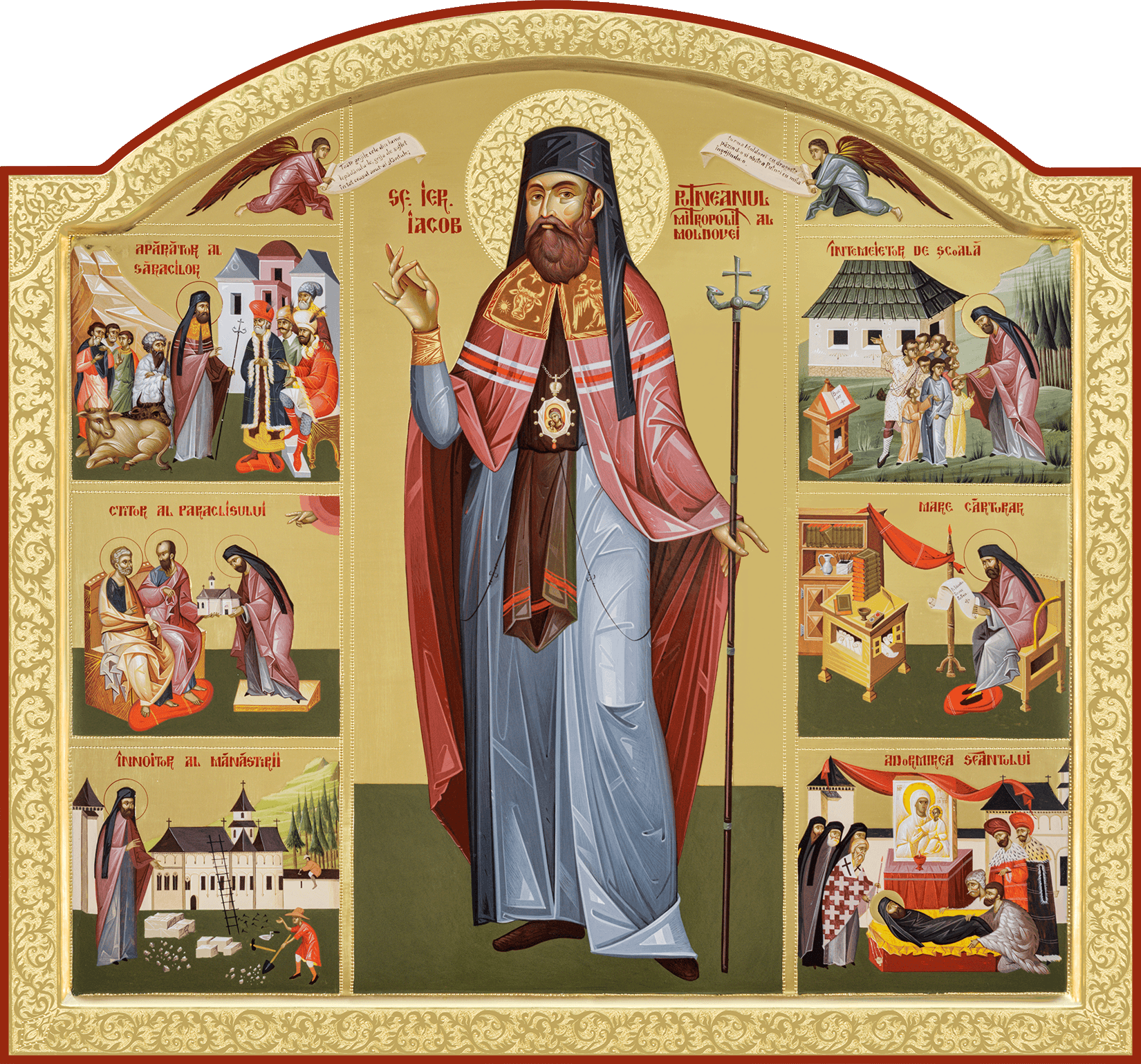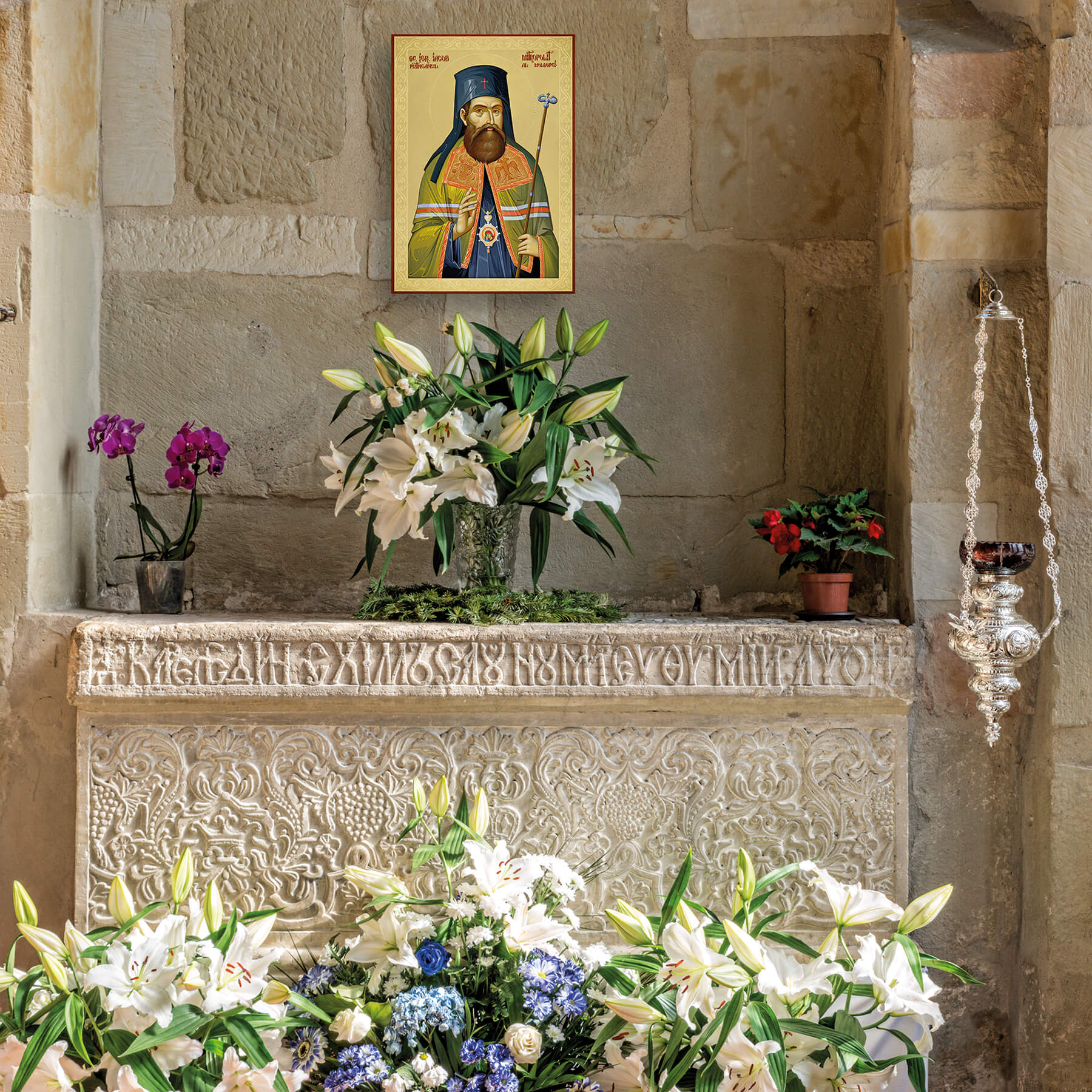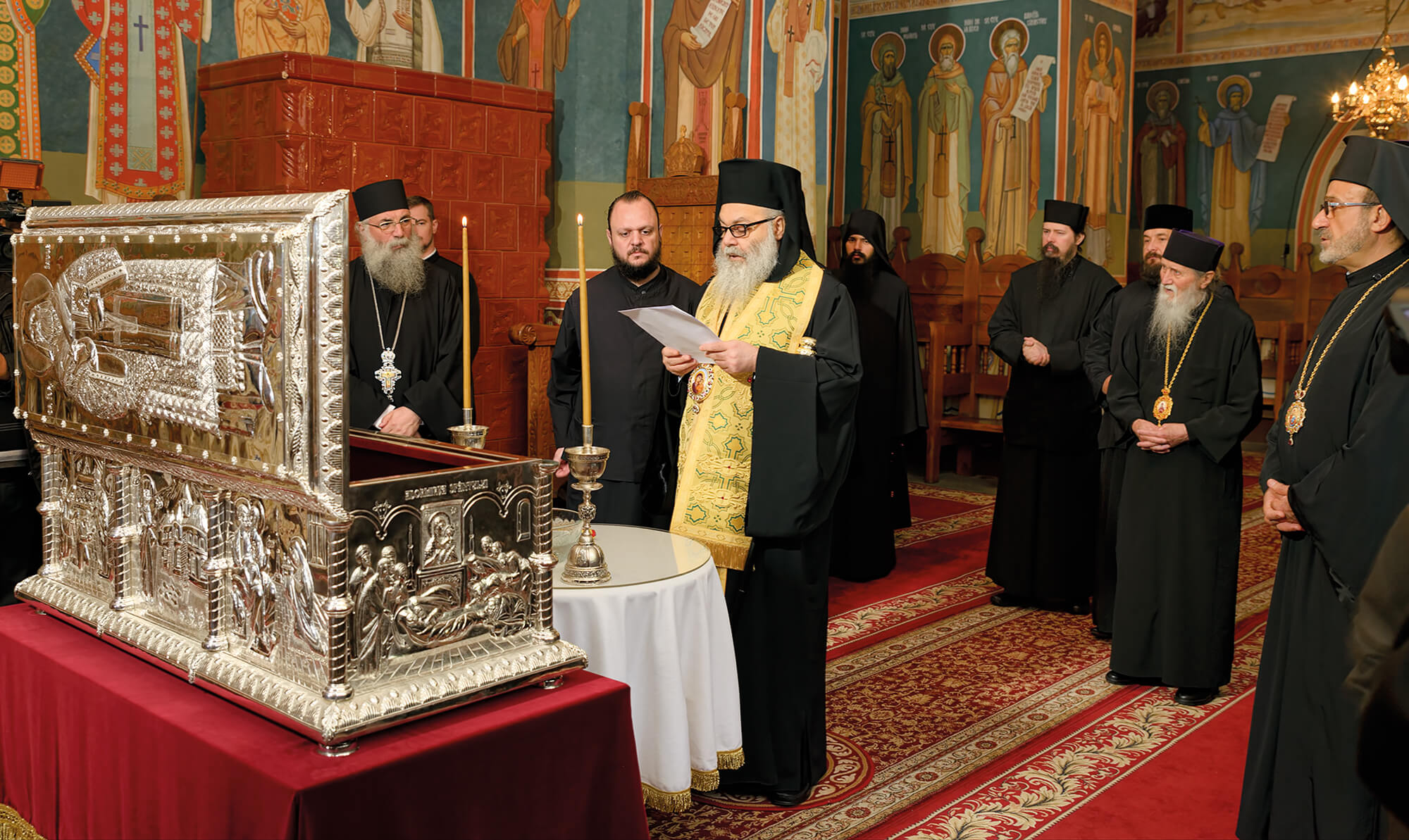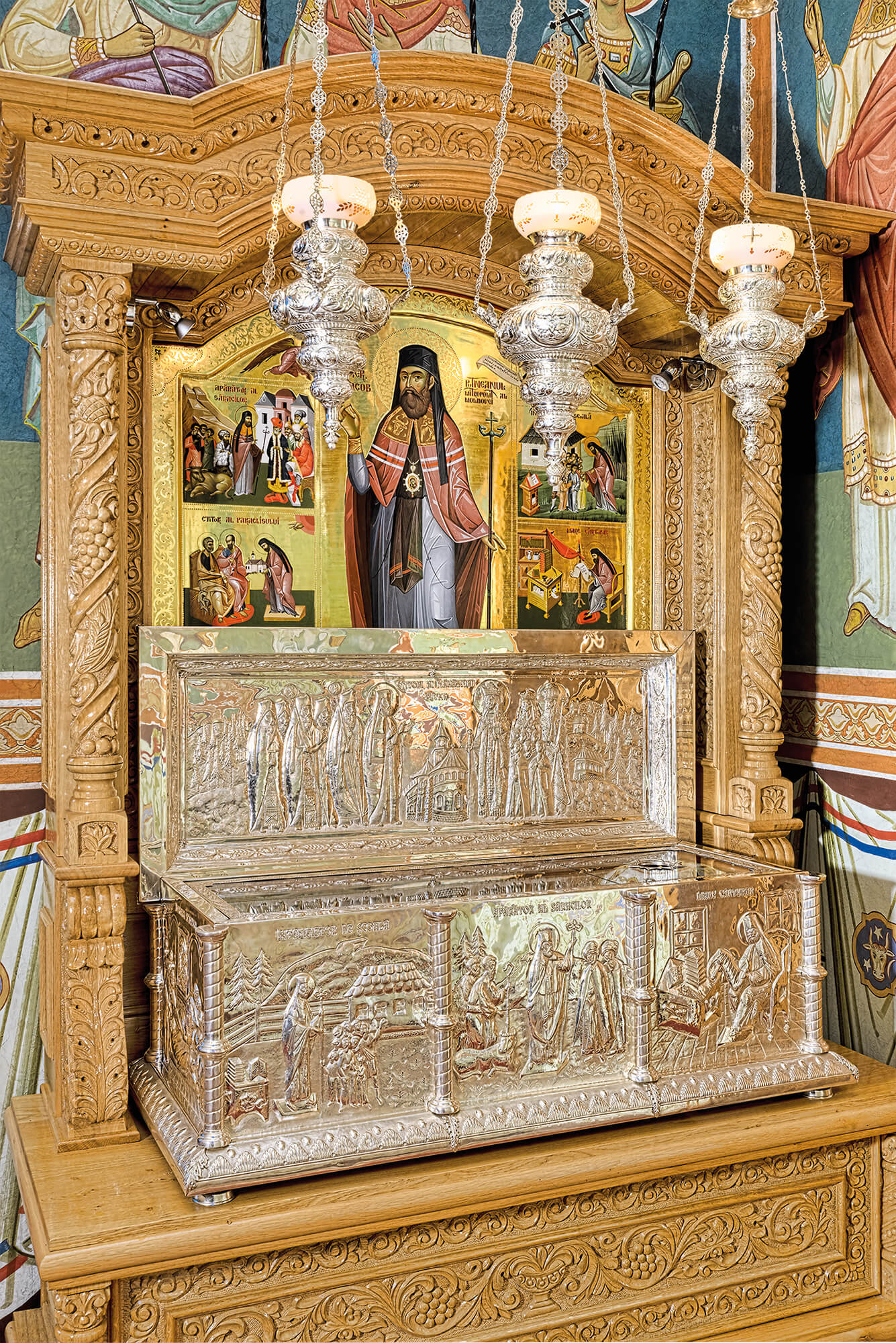Holy Hierarch Jacob of Putna was the spiritual father who watched over monastic life at the Putna Monastery and its other monastic settlements – Sihăstria Putnei, Sihăstria Ursoaia, and the ancient Monastery (Prince Dragoș’ church), during the mid- and latter half of the 18th century. This saint’s life and holy deeds have not remained obscured, but serve as an example of service to God with all one’s heart and strength, through all the gifts bestowed by God upon the great hierarch.

Holy Hierarch Jacob of Putna
Holy Hierarch Jacob of Putna
Troparion of the Holy Hierarch Jacob of Putna
Having put aside all earthly care and having lived an ascetic life, as a good shepherd, you have preserved thy flock from Moldavia; therefore, you rejoice now in heaven together with the angels. Holy Metropolitan Jacob, hierarch of Christ, pray that our souls may be saved.
The icon painted by the Putna Monastery fathers for the canonization of the Holy Hierarch Jacob of Putna.
The Akathist Hymn to the Holy Hierarch Jacob of Putna
Spiritual words
The spiritual family of the 18th-century Putna monks
Metropolitan Jacob was born on January 20th, 1719, in a faithful and orderly family from the north of Moldavia. Most of the family members took the monastic vows later in life: his parents received the monastic names of Adrian and Mariana, his brother became Monk Joel, a sister became Nun Pelagia, and the other sister, Maria, married, her husband becoming Hieromonk Misail (Mishael) at the Doljești Skete.
Driven by his zeal for Christ, at the age of 12, he entered monastic life Putna Monastery. In the spiritual atmosphere of the monastery, a true monastic school, where spiritual fathers passed on the art and responsibility of living in God from one generation to the next, he was molded into the spiritual father that his later deeds and writings showed him to be.
In Putna he was a disciple of Metropolitan Anthony, whom he considered his starets – meaning here elder and spiritual father. Thus, he joined a spiritual lineage which had begun with Metropolitan Sava Balaci, in the first half of the 18th century and continued with Bishop Calistru of Rădăuți, Metropolitan Anthony, then St. Jacob of Putna. In the Diptychs of the monastery, compiled by order of St. Jacob in 1756, this connection is mentioned next to Metropolitan Sava’s name as following: “Metropolitan Sava: He tonsured Bishop Calistru and Calistru tonsured Metropolitan Anthony, while Anthony tonsured Metropolitan Jacob”.
Metropolitan Anthony of Moldavia
Metropolitan Anthony was St. Jacob of Putna’s spiritual father and the one who tonsured him into monasticism. He became a monk at Putna Monastery and lived as a hermit at the Horecea Skete near Chernivtsi. He was Bishop of Rădăuți and then Metropolitan of Moldavia from 1729 to 1739. Following one of the Russo-Turkish wars, he was forced to leave the country and served as Metropolitan of Chernihiv and Belgorod – then in Russia, now in Ukraine. He passed away on January 1, 1748.
Painting from the Metropolitan Residence in Iași.
This young man with an old man’s wisdom and a chosen life was ordained to the priesthood when he was 17, then elected abbot of Putna Monastery when he was 25, and Bishop of Rădăuți at 26. After only five years, his worthiness and zeal were decisive for his transfer to the see of the Metropolis of Moldavia in Iași, and he was enthroned on November 13, 1750.
Between 1750 and 1760, he carried out intense pastoral and social work, promoted Romanian culture and printing, and oversaw the translation of books. He succeeded in opening another printing press in Iași, and in 10 years, he printed more than 15 books of service and teaching in Romanian. They were used in churches and monasteries in all the areas inhabited by Romanians and were particularly useful in defending the Orthodox identity of the Romanians in Transylvania.

A soul from the soul of his people, St. Jacob grieved for the illiteracy of the faithful, writing that “all life flows out of raising children as from a good or bad root”. That is why he founded schools and printed educational books and books of religious service.
To fulfill the need for books to teach children, 1755 he printed the first primer in Moldavia, the Bucvar. In its preface, St. Jacob wrote about the importance of children's education and the great need for children's books: “How can you hope for good where there is no good food for children? And who cannot see that such food is lacking in this land?”
At his proposal, the first documented rural elementary school in Moldavia was established for the children of the Putna village, which has been in continuous operation to this day. Among other things, he wanted to offer the people, in their mother tongue, access to the models of human perfection – the saints. That is why he ordered the translation into Romanian of the Lives of the Saints, veritable spiritual textbooks in which people of all ages, natures, and social status could find life models. At his recommendation, 6 of the 12 volumes of the work were translated, although without being published: The Lives of the Saints for March, April, May, September, October, and November.
Having become the highest hierarch of the land, the metropolitan put into practice the words of our Savior Jesus Christ: “Anyone who wants to be first must be the very last, and the servant of all” (Mark 9:35). Not only did he edify the people in spirit, but, when necessary, he fought unselfishly in their defense. During the difficult period of the Phanariot reigns, he intervened with the other hierarchs of the land to eliminate several very burdensome taxes, especially the cow tax, binding the rulers of the land with a curse so that they never reinstated it.
St. Jacob's opposition to the cow tax was so important that two verses have survived in folklore recalling his deed:
“Metropolitan Jacob,
Who bound the cow tax.”
Metropolitan Jacob thus came into conflict with some of the political leaders of those years. For this reason, the Holy Metropolitan did not hesitate to lay down his soul for his rational flock, finally stepping down from the metropolitan seat in 1760.
The words he spoke at that moment represent his creed: “He bade farewell from the prince and all the boyars of the land, saying to them: Behold, I have renounced metropolis, and honor, and all the things of this world, lest the fire of the oath should be on my mind and my soul; you should consider yourselves guests of this world, a world where we have to live and be accountable for all our deeds; and may you be in good health”. All the people, boyars and commoners, wept bitterly at his leaving the Metropolitan seat, for they knew that a great shepherd was leaving them – “the shepherd of the poor and humble [...] who had led a saint's life”, as Romanian historian Nicolae Iorga wrote about him.

In the last part of his life, St. Jacob retired to his monastery of repentance, Putna, where he continued the acts of foundation begun during his time as a metropolitan, thus becoming the second great founder of Putna, which he rebuilt almost entirely.
In addition to his care for the Putna Monastery and its settlements, St. Jacob also helped other holy places which today consider him as their second founder: the Doljești Monastery, St. Demetrius' Church in Suceava, the Diocesan Cathedral in Suceava and the Metropolitan Cathedral in Iași, the “St. Spyridon” Monastery and Hospital in Iași. Through his support and advice given to the Romanian merchants of Suceava, he helped revive the city in the second half of the 18th century.
His retreat to the monastery was an opportunity to deepen prayer that cleanses from sins and enlightens the soul. He said about prayer: “Godly prayer, by bringing the light of Christ into our souls and dispelling the darkness that veils them, makes them brighter than the sun, for it is well known that he who speaks to God is above death and destruction”.
Now he had more peace and rest than when he served as a metropolitan. All his life, he had longed for the beauty and depth of hermitic life, but he could not fully embrace it, for God had ordained him first to the hierarchical service, then, after his retirement, he had to continue to be a shepherd of souls in every way.
He expressed this deep longing to all and fulfilled it five days before he passed away. He went to the main hermitage of the monastery, Sihăstria Putnei (the Putna Hermitage), to be tonsured into the Great Schema by his decade-long spiritual guide and collaborator, Venerable Nathan, receiving the name of Ephtimius, after St. Ephtimius the Great, a great guide of the monks, whom he especially honored all his life and on whose feast day, January 20, he had been born.
He had a venerable demise, after having received the Great Schema, on a Tuesday evening, before the Wednesday of the Leave-taking for the feast of the Resurrection of the Lord, when the Typikon requires that the entire service of the Resurrection be officiated just like on Easter night.

Bearing with zeal and dignity the cross of his hierarchical service, and with meekness and humility the cross of being unrightly persecuted, sacrificing himself for his people, Holy Metropolitan Jacob dedicated his entire life to the service of the Church—illuminating the faithful through the Holy Mysteries, through prayer, education, and catechesis; defending the oppressed; and fostering Romanian culture and spirit. His many labors and sacrificial service as a shepherd of souls have led his pure soul into the arms of Christ.
The devotion of monastics and the faithful towards him has deepened over time, as the hierarch started to be honored by people as a saint.
Taking heed of Saint Jacob’s exemplary life, the Holy Synod of the Romanian Orthodox Church, in its session of June 6–7, 2016, decreed his canonization along with his disciples, Venerable Saints Silas, Paisius, and Nathan. The feast of Saint Jacob is celebrated on May 15, the day of his repose in the Lord, while that of the Venerable Saints Sila, Paisius, and Nathan is on the following day, May 16, so that they may be honored along with their spiritual father.
On June 15, 2016, in the presence of His Eminence Pimen, Archbishop of Suceava and Rădăuți, the monks of the monastery opened the crypt in the narthex of the princely church, where Saint Jacob had been laid to rest.
Archimandrite Melchisedec Velnic, abbot of Putna Monastery, described the uncovering of the saint’s relics as follows:
“We found him like a loaf of bread, baked and golden—the color of sanctity and perfection in the Lord. We found him humbly clothed. We have sensed that, when he said, ‘I have renounced the metropolis’, he had truly renounced all things of this world. He was laid to rest simply, clothed in the monastic vestments of the Great Schema, only with a simple wooden cross covered in silver.”
His holy relics were laid into a reliquary on September 25, 2016, as part of the celebration marking 550 years since the founding of the Putna Monastery by Holy Voivode Stephen the Great. The reliquary for the saint’s relics was consecrated by His Beatitude John X, Patriarch of Antioch and All the East.

Sunday, May 14, 2017, was the solemn proclamation of the canonization of our saintly Father Jacob of Putna, Metropolitan of Moldavia, and his disciples, the Venerable Saints Silas, Paisius, and Nathan.
The glorification of these saints was expressed during the Divine Liturgy celebrated by His Beatitude Daniel, Patriarch of the Romanian Orthodox Church, together with His Eminence Teofan, Metropolitan of Moldavia and Bukovina, His Eminence Pimen, Archbishop of Suceava and Rădăuți, along with other hierarchs, clergy, and faithful from Romania and sister Orthodox Churches.
The work of God is visible in this hierarch adorned with every virtue like the great shepherds of the Church: merciful, a lover of the poor, able to mediate between rulers and the people, a savior of human lives, and a peacemaker.
Through all his labors and by the grace of God, Saint Jacob now rejoices in heaven together with those holy hierarchs whom God has given to the Romanian people to guide and protect them in times of trial—among them Saints Hyacinth of Vicina, Theoctistus I, Varlaam, Dosoftei, Anthim the Iberian, Gregory the Teacher, Callinicus of Cernica, and Andrei Șaguna.

For all of us, Holy Metropolitan Jacob of Putna stands as a model of self-sacrifice, of bearing the cross, and of a life wholly dedicated to the service of God and his neighbor. He is a gentle intercessor for us before Christ our Lord in the heavenly realms.







